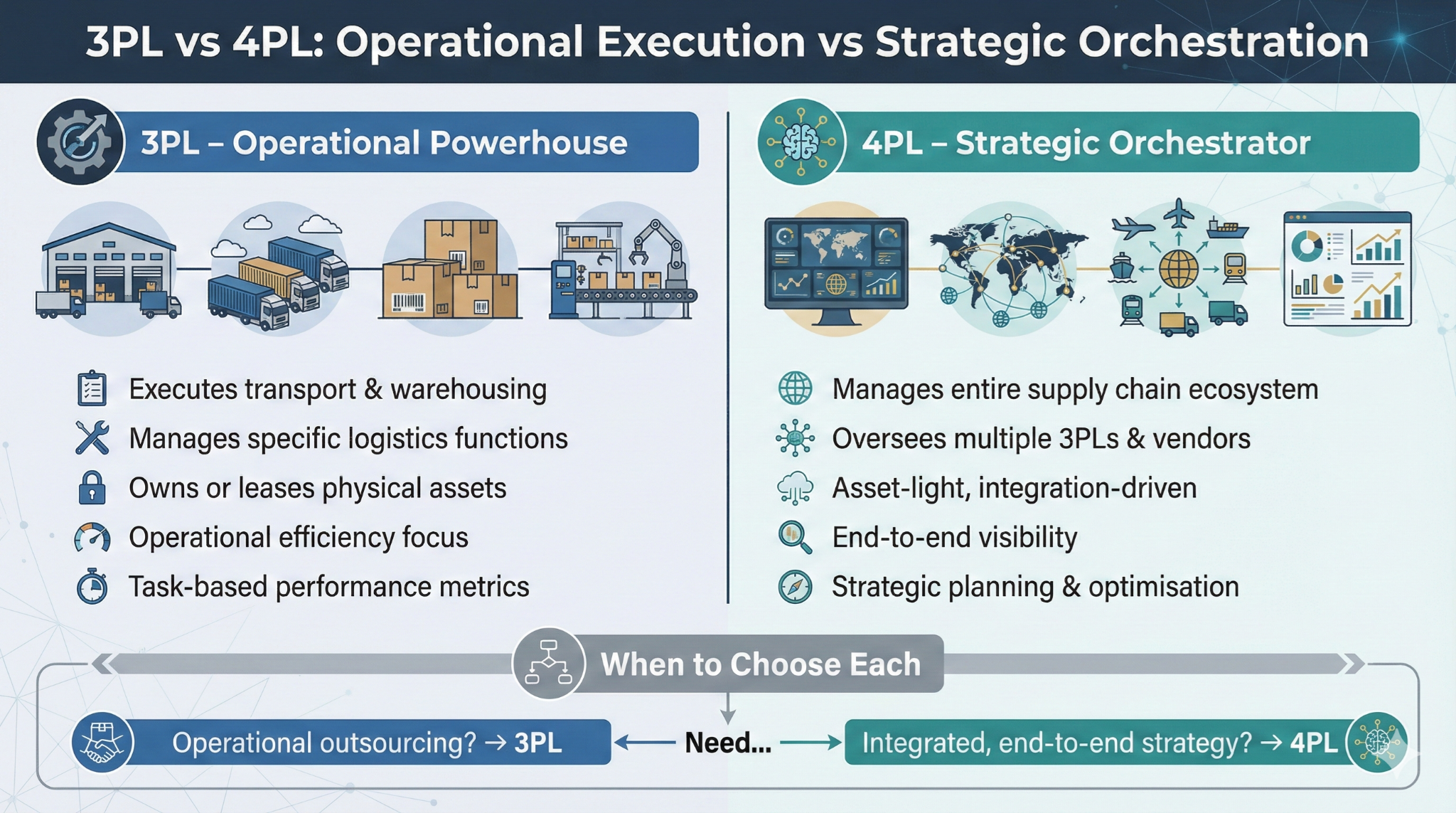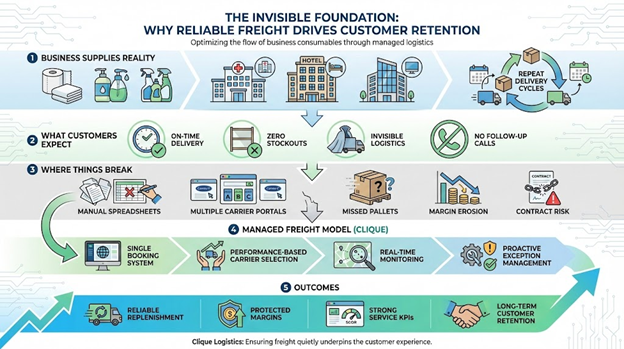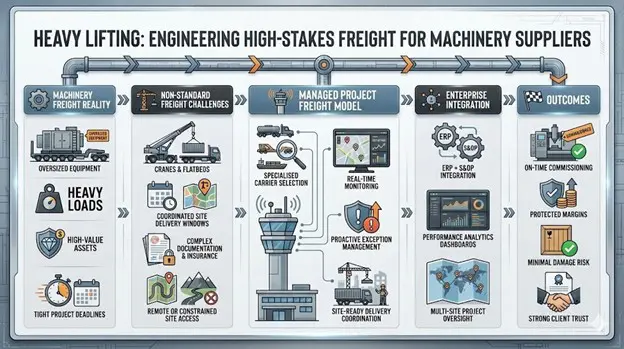Freight brokers act as crucial links between shippers and carriers. They negotiate rates, find the best shipping solutions, and guarantee compliance with safety standards. You can count on them for real-time updates on shipments and performance reports, optimising delivery while reducing costs. Unlike dispatchers, who manage daily operations, and freight forwarders, who handle international logistics, brokers focus on business-to-business transactions. Choosing the right freight broker involves evaluating their services, technology, and customer support. If you’re curious about how they can benefit your logistics strategy, you might want to investigate further insights.
Key Takeaways
- Freight brokers serve as intermediaries, connecting shippers with carriers to facilitate the transportation of goods efficiently.
- They negotiate shipping rates and solutions, ensuring compliance with safety standards and managing freight insurance.
- Utilising advanced technology, freight brokers provide real-time shipment tracking and generate performance reports for better decision-making.
- Key considerations when choosing a freight broker include their financial stability, carrier safety measures, and customer service capabilities.
- Partnering with a reliable freight broker can streamline supply chain processes, reduce costs, and enhance operational efficiency.
Roles and Responsibilities of Freight Brokers
Freight brokers play a vital role in the logistics environment, connecting shippers with carriers to manage the transportation of goods effectively. They provide crucial freight broker services by acting as intermediaries, negotiating rates, and securing reliable carriers for your shipments. You can count on them to simplify the shipping process, making certain that your goods reach their destination on time and within budget.
One of their key responsibilities is monitoring shipments throughout the entire journey. They offer real-time updates, so you’re never left in the dark about your cargo’s status. This proactive approach helps prevent delays and guarantees timely loading and unloading at specified locations.
Freight brokers likewise generate monthly reporting dashboards, which allow you to evaluate shipment performance and costs effectively. By maintaining a network of vetted carriers, they focus on optimising delivery times while reducing costs through competitive tendering.
Moreover, they guarantee compliance with safety standards and regulations, managing freight insurance and ensuring cargo compatibility with transportation vehicles.
With a freight broker by your side, you can navigate the complexities of logistics with confidence, knowing your shipments are in capable hands.
Differences Between Freight Brokers, Dispatchers, and Freight Forwarders
In the logistics industry, understanding the distinctions among freight brokers, dispatchers, and freight forwarders is essential for optimising your shipping strategy.
Freight brokers act as intermediaries between you and carriers, negotiating rates and ensuring compliance while focusing on finding the best shipping solutions for your needs. They don’t own transportation assets; instead, they utilise a network of carriers to aid your transportation process.
On the other hand, dispatchers manage the day-to-day operations of freight movement. They work for trucking companies, ensuring that drivers are on schedule, freight is loaded properly, and deliveries are tracked efficiently. Their role is more operational compared to that of freight brokers.
Freight forwarders, meanwhile, specialise in international shipping logistics. They manage all aspects of cross-border transport, including documentation and compliance with regulations.
Unlike freight brokers, who primarily handle business-to-business transactions, freight forwarders coordinate shipments from origin to destination, arranging storage and handling.
Importance of Freight Brokers in Logistics
Effective logistics relies heavily on the pivotal role of brokers, acting as vital intermediaries between shippers and carriers. A freight broker connects you with suitable transportation providers, streamlining the entire process of moving goods. By leveraging their extensive network of logistics companies, they negotiate better shipping rates and optimise delivery routes, saving you money and time.
Freight brokers are fundamental for managing the complexities of logistics. They monitor shipments, coordinate loading and unloading, and guarantee compliance with safety regulations. This allows you to focus on your core operations while knowing your freight management services are in capable hands.
Moreover, brokers utilise advanced technology for tracking and analytics, enhancing visibility and transparency in supply chain management. This improved operational efficiency means you get timely, reliable service, critical for maintaining customer satisfaction.
In a world where logistics can be intricate, relying on a freight broker simplifies your shipping processes, contributing to your business’s overall success. With their expertise, you can rest assured that your goods are handled professionally, securing condition-sensitive deliveries every time.
Key Considerations When Choosing a Freight Broker
When you’re choosing a freight broker, it’s crucial to assess their financial stability to confirm they can handle your needs over the long term.
You’ll additionally want to evaluate their carrier safety measures to assure your shipments are in good hands.
Assessing Financial Stability
Frequently evaluating a freight broker’s financial stability is vital for guaranteeing a smooth logistics operation. Start by examining the freight brokerage company’s founding date and operational history; this gives you insight into its experience and trustworthiness.
Next, investigate its operational capacity, including the number of employees, to verify it can effectively handle your transportation needs.
Reviewing the brokerage’s financial records or credit ratings is fundamental. This will help you gauge its financial stability and ability to manage potential load issues.
Moreover, consider customer retention rates; high retention often reflects reliable service and strong financial health. A broker with a solid track record is less likely to face unexpected disruptions.
Evaluating Carrier Safety Measures
Evaluating carrier safety measures is vital for guaranteeing the reliability of your freight operations, especially since the wrong choice can lead to costly delays or accidents.
Start by examining the carrier vetting process used by your freight broker. Make certain they conduct thorough background checks and compliance assessments to select only reliable transportation partners.
Next, review the safety performance metrics of the carriers they work with, such as accident rates and adherence to safety regulations. This will give you insight into the broker’s commitment to safe transport practices.
Inquire about their protocols for monitoring carrier safety records and how often they update these assessments to maintain high safety standards.
Don’t overlook the importance of safety training for carriers, as this plays a significant role in the overall reliability and safety of freight transport.
Finally, check if the broker has systems in place for reporting safety incidents. This reflects their proactive approach to maintaining transport safety and can significantly impact your operations.
Aligning Shipping Needs and Services
Choosing the right freight broker is vital for aligning your shipping needs with the services offered. When evaluating freight broker companies, consider their ability to handle the specific types of freight you require, whether it’s refrigerated, dry van, or flatbed services. This guarantees compatibility with your operations.
Geographic coverage plays a significant role too. The broker should support shipments to all regions where your business operates, providing thorough service and visibility.
Don’t forget to assess their experience with specific commodities and preferred lanes; these factors can help optimise your logistics strategy.
Technology is another key consideration. Inquire about their freight management systems for load tracking and visibility, as this can improve communication and efficiency throughout the shipping process.
It’s fundamental that the broker demonstrates a strong commitment to customer service. Their capacity to customise solutions will address your unique shipping challenges effectively and proactively.
Furthermore, if your shipments require customs clearance, verify that the broker can likewise act as a customs broker, streamlining the process.
How to Evaluate Top Freight Brokerage Companies
When evaluating top freight brokerage companies, you should start by analysing the services they offer.
Look for client-oriented features that can improve your shipping experience, such as tracking capabilities and customer support.
Understanding these aspects will help you choose a broker that meets your specific needs.
Analysing Services Offered
Finding the right freight brokerage company can significantly impact your logistics operations, so it’s essential to analyse the services offered. Start by evaluating their freight brokerage services to guarantee they can handle various freight types, like refrigerated, dry van, and flatbed. This confirms they meet your specific shipping needs.
Next, investigate the size and quality of their carrier network. A strong network with reputable trucking companies can greatly improve your delivery performance.
Flexibility matters too—ask about supplementary logistics services such as warehousing and inventory management, which can boost supply chain efficiency.
Don’t forget to look into their ability to provide customised solutions. A broker that tailors its offerings to your unique requirements shows a commitment to your business.
Furthermore, assess their technology for load tracking and visibility. Innovative tracking tools can increase overall shipping efficiency and safety, allowing you to monitor shipments in real time and integrate seamlessly with your systems.
Client-Oriented Features
To guarantee you select a top freight brokerage company, it’s vital to assess their client-oriented features that directly impact your logistics experience.
Start by evaluating their freight services. A diverse range guarantees they can handle various types of shipments, giving you flexibility in service offerings tailored to your needs.
Next, look into the quality of their customer service team. Are they responsive and able to customise solutions based on your unique requirements? High service quality is critical for successful logistics management.
Don’t forget to investigate their carrier network. Reliable networks of well-managed and vetted carriers are fundamental for guaranteeing safe and timely transportation of your goods.
Additionally, examine how the brokerage utilises advanced technology. Tools for load tracking and visibility can significantly improve communication and operational efficiency, making it easier for you to stay updated on your shipments.
Lastly, consider the brokerage’s financial stability and industry longevity. Established companies with a customer-first approach are more likely to deliver consistent service quality and reliability, providing you with peace of mind in your logistics operations.
Benefits of Partnering with a Reliable Freight Management Service
Partnering with a reliable freight management service can significantly improve your operational efficiency and cut costs.
You’ll benefit from streamlined supply chain solutions that simplify complex logistics processes.
This allows you to focus on your core business while enjoying enhanced visibility and control over your shipments.
Enhanced Operational Efficiency
Frequently, businesses that engage a dependable freight management service notice a significant increase in operational efficiency. By automating time-consuming freight processes, you can significantly reduce operational errors. This automation not only streamlines your logistics but furthermore allows you to focus on core business activities.
With advanced analytics and reporting tools, a freight management service helps you identify cost-saving opportunities, which can improve your shipping strategies. You can quickly analyse your shipping patterns and make data-driven decisions that lead to better outcomes.
Moreover, having a freight broker as your single point of contact simplifies communication and support during the shipping process. This streamlined approach means fewer misunderstandings and delays, contributing to improved efficiency.
When operational disruptions occur, you’ll appreciate the ability to switch carriers quickly. This flexibility guarantees your supply chain remains resilient, adapting to changes without missing a beat.
Plus, leveraging a freight broker’s knowledge of ideal carriers and their group buying power translates into substantial financial advantages, allowing you to enjoy lower shipping rates.
In short, partnering with a dependable freight management service is a smart move for improving efficiency and boosting your bottom line.
Cost-Effectiveness
Improving operational efficiency naturally leads to significant cost savings when you engage a reliable freight management service. By partnering with freight brokers, you tap into their extensive network of carriers, allowing you to enjoy more competitive rates that can substantially lower your shipping costs.
These brokers excel at optimising carrier selection, ensuring you get the best possible terms while reducing your operational burdens. Freight brokers automate time-consuming processes, which minimises errors and inefficiencies in your logistics management.
This streamlined freight arrangement not only saves you time but likewise cuts down administrative overhead by providing a single point of contact for all freight-related issues. With access to advanced analytics and reporting tools, brokers help you identify cost-saving opportunities, empowering you to make educated choices.
In essence, working with a reliable freight management service is a cost-effective strategy that improves your bottom line. By leveraging the broker’s expertise and resources, you can achieve smoother operations and substantial savings, allowing you to focus on what you do best—growing your business.
Streamlined Supply Chain Solutions
A well-structured supply chain can significantly boost your business’s efficiency and responsiveness. By partnering with a reliable freight management company, you unlock streamlined supply chain solutions that can transform your logistics operations.
Freight brokers act as your dependable ally, automating time-consuming processes that reduce operational errors and improve delivery timelines.
With a dedicated team of freight professionals, you gain seamless collaboration and flexibility in carrier options. This adaptability allows you to quickly respond to changing logistics needs.
An advanced technology platform used by these brokers provides powerful analytics and reporting tools, helping you identify cost savings and optimize shipping routes, which ultimately lowers transportation expenses.
Utilising a single point of contact for all freight-related issues simplifies communication and improves support, streamlining the entire supply chain process.
Moreover, reliable freight brokers maintain existing carrier rates and relationships through integrated software, ensuring stability in your shipping operations.
By leveraging these resources, you can focus on growing your business while knowing your logistics are in capable hands.
Take advantage of the benefits of partnering with freight brokers to enhance your supply chain efficiency today.
Challenges Freight Brokers Face
As a freight broker, you face significant challenges that can impact your operations.
Market volatility can throw your pricing strategies off balance, while keeping up with regulatory compliance demands constant attention.
Plus, adapting to new technologies is essential if you want to stay competitive in this fast-paced industry.
Market Volatility
In today’s fast-paced logistics environment, market volatility poses significant challenges for freight brokers. You often navigate fluctuating fuel prices that can heavily impact shipping costs and profit margins. Sudden shifts in demand, whether because of economic changes or global events, lead to capacity shortages, making it tough to secure reliable transportation options for your clients.
Seasonal variations in freight volume add another layer of complexity, forcing you to adapt quickly to changing market conditions and customer needs. As you work to find effective supply chain solutions, disruptions in one area—like labour strikes or natural disasters—can ripple through the entire logistics network. This unpredictability complicates your efforts to maintain efficiency and meet delivery timelines.
Moreover, keeping up with regulatory changes requires you to stay informed and agile in your operations. The constant evolution of compliance requirements can introduce uncertainties that add to the overall pressure you face as a freight broker.
Balancing these challenges while striving to provide exceptional service is vital in today’s volatile market, making your role both demanding and fundamental.
Regulatory Compliance
Manoeuvring regulatory compliance is one of the most significant challenges freight brokers face today. You must adhere to the regulations set by the Federal Motor Carrier Safety Administration (FMCSA), which includes obtaining the necessary licensing and maintaining financial responsibility through bonding and insurance.
Ensuring that all carriers you work with comply with safety regulations can be intimidating; any lapse can lead to legal liabilities for you. The complex nature of federal, state, and local regulations creates compliance difficulties, especially when you operate across multiple jurisdictions with varying rules.
You need to maintain detailed records of all transactions and communications to demonstrate compliance during audits, which can be resource-intensive and time-consuming. Furthermore, the regulatory environment is constantly evolving, with new safety and environmental standards adding to the pressure.
You must continuously update your compliance practices and training to stay ahead. These challenges can be overwhelming, but staying informed and proactive is crucial for your success in the freight brokerage industry.
Technology Adaptation
Maneuvering technology adaptation poses significant challenges for freight brokers today. You’re tasked with integrating advanced technology into existing legacy systems, which often hinders operational efficiency and data accuracy.
As the logistics environment evolves, the need for continuous investment in training and resources becomes evident. Staying competitive means you must adopt digital advancements, but that can feel overwhelming.
Data security is another pressing concern. You manage sensitive customer and shipment information, making it vital to implement robust cybersecurity measures and comply with regulations.
The complexities of adopting multi-carrier freight management systems can likewise present significant hurdles, including high upfront costs and the need for ongoing support.
Furthermore, resistance to change from traditional practices within the industry can slow your progress in adopting new technologies. This resistance not only impacts your ability to optimise services but also affects customer satisfaction.
In an era where efficiency and security are paramount, overcoming these challenges is fundamental. By addressing these obstacles head-on, you can improve your freight brokerage operations and ultimately deliver better value to your clients.
Future Trends in Freight Brokerage
As you look ahead in the freight brokerage industry, you’ll notice technology and automation are reshaping how brokers operate, enhancing efficiency and decision-making.
Sustainability is likewise becoming essential, pushing you to adopt greener practices and reduce carbon footprints.
Plus, with growing demands for visibility and tracking, you’ll need to implement solutions that provide real-time updates and transparency throughout the shipping process.
Impact of Technology and Automation
Technology and automation are revolutionising the freight brokerage industry, making processes more efficient and cost-effective. With advanced Transport Management Systems (TMS), you can automate numerous tasks, resulting in significant time savings and fewer operational errors. This automation improves real-time tracking and visibility of shipments, boosting customer satisfaction and overall operational efficiency.
By adopting artificial intelligence (AI), you can optimise route planning and carrier selection, ultimately reducing transportation costs while improving service delivery. Utilising data analytics tools allows you to identify cost-saving opportunities and reach well-informed conclusions based on historical shipping patterns. This strategic approach helps you stay ahead of the competition.
Moreover, cloud-based platforms promote seamless communication and collaboration among brokers, shippers, and carriers. This integration drives innovation in freight management practices, ensuring that everyone involved has access to the information they need when they need it.
As technology continues to evolve, embracing these advancements will be vital for your success in the freight brokerage sector. By leveraging automation and data-driven insights, you can streamline operations and improve the value you provide to your clients.
Stay proactive, and you’ll thrive in this rapidly changing environment.
The Growing Role of Sustainability
Sustainability is becoming a pivotal focus in the freight brokerage industry, with many brokers recognising the need to adopt eco-friendly practices.
As a freight brokerage professional, you’re likely aware that the demand for sustainable logistics solutions is rising. To stay competitive, you must prioritise partnerships with eco-friendly carriers that utilise green technologies.
Incorporating carbon footprint calculations into your services can help shippers understand and lessen their environmental impact, which is increasingly crucial in today’s market.
Regulatory pressures are similarly pushing you to adopt sustainability measures, making compliance with environmental standards non-negotiable for operational viability.
Utilising data analytics allows you to identify inefficiencies in your transport processes.
By analyzing this data, you can implement strategies that not only reduce carbon emissions but also improve resource management and reduce waste.
This proactive approach not only positions your brokerage as a leader in sustainability but likewise attracts clients who value eco-conscious practices.
Demand for Enhanced Visibility and Tracking
The logistics environment is rapidly changing, and shippers now expect improved visibility and tracking for their shipments. Improved visibility is no longer just a luxury; it’s a necessity for effective freight brokerage.
With the integration of advanced tracking technologies like GPS and RFID, you can offer your clients real-time updates on their shipments, allowing for better decision-making and increased customer satisfaction.
Data analytics plays an essential role in this transformation. By analysing shipment data, you can identify inefficiencies and optimise routes, leading to reduced transit times and improved service levels.
This not only boosts your operational efficiency but also helps meet compliance and risk management requirements.
As e-commerce continues to grow, the call for accurate tracking information intensifies. Shippers expect timely delivery along with condition-sensitive updates, pushing freight brokers to invest in innovative technologies.
By prioritising improved visibility and adopting these tracking solutions, you can build stronger relationships with your clients and stay ahead of the competition.
Embracing these future trends will position your brokerage as a leader in the constantly changing logistics environment.




